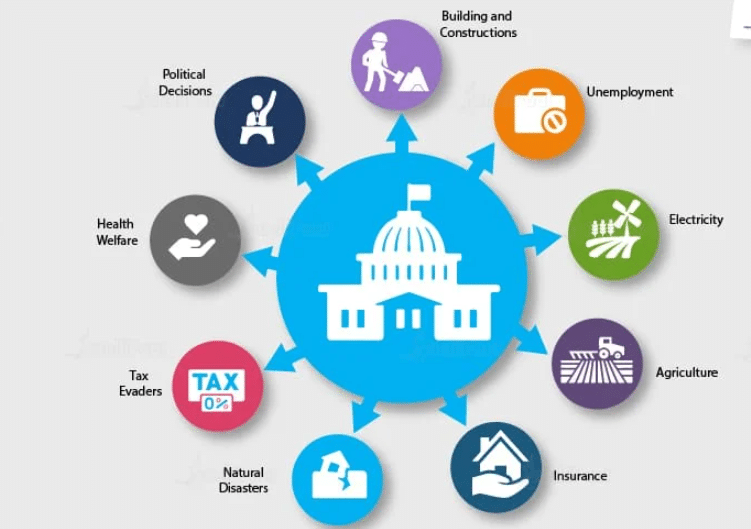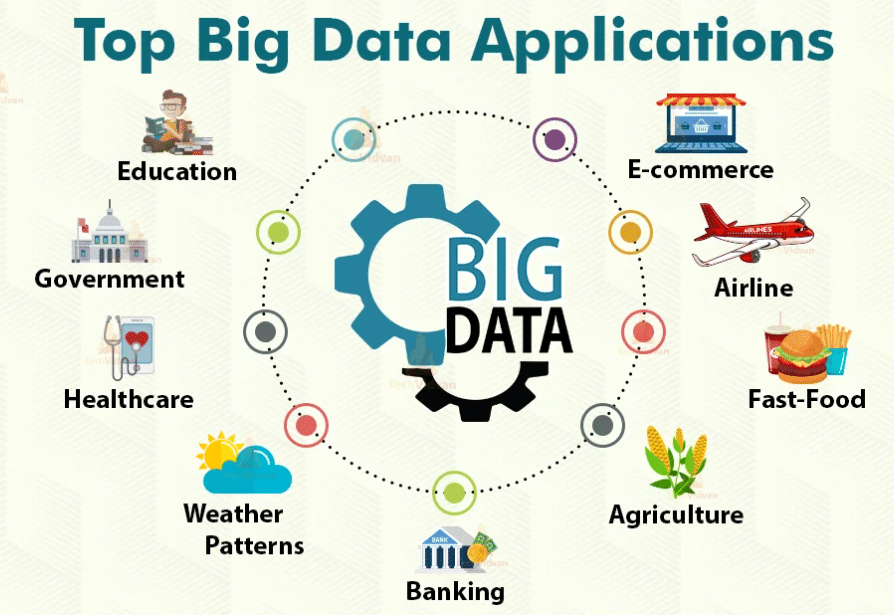Big Data In Business and Examples
Big Data In Business and Examples has become a valuable asset for businesses across various industries. It refers to the vast volume of structured, semi-structured, and unstructured data that organizations collect from various sources.
Their Leveraging Big Data In Business and Examples

Leveraging big data in business offers several advantages:
Enhanced Decision-Making:
Big data analytics enables organizations to derive insights from large and diverse datasets. By analyzing this data, businesses can make data-driven decisions, identify patterns, and uncover trends that help optimize processes, improve customer experiences, and drive innovation.
Improved Operational Efficiency:
Analyzing big data can help organizations identify inefficiencies in their operations. By understanding patterns and trends in data, businesses can optimize workflows, streamline processes, and enhance productivity, leading to cost savings and improved efficiency.
Personalized Customer Experiences:
Big data analytics allows businesses to gain a deeper understanding of their customers. By analyzing customer behavior, preferences, and interactions, organizations can tailor their products, services, and marketing efforts to deliver personalized experiences that resonate with individual customers.
Targeted Marketing and Advertising:
Big data enables businesses to segment and target their marketing and advertising efforts more effectively. By analyzing customer demographics, purchasing patterns, and online behaviors, organizations can create targeted campaigns, improve customer engagement, and optimize marketing spend.
Risk Analysis and Fraud Detection:
Big data analytics helps organizations identify potential risks and detect fraudulent activities. By analyzing large datasets in real-time, businesses can detect anomalies, patterns of fraud, or potential security breaches, mitigating risks and protecting their operations and customers.
Predictive Analytics:
Big data analytics leverages historical and real-time data to make predictions and forecasts. By using advanced analytics techniques such as predictive modeling and machine learning, businesses can anticipate market trends, customer behavior, demand patterns, and make proactive decisions accordingly.
Product and Service Innovation:
Big data provides valuable insights into customer needs, preferences, and market trends. By analyzing this data, organizations can identify new opportunities for innovation, develop new products or services, and improve existing offerings to meet customer demands and gain a competitive edge.
Supply Chain Optimization:
Big data analytics can optimize supply chain management by improving demand forecasting, inventory management, and logistics. By analyzing data from various sources such as suppliers, manufacturers, and distributors, businesses can optimize their supply chain processes, reduce costs, and improve overall operational efficiency.
Improved Customer Support:
Big data analytics enables businesses to gain insights into customer sentiment, feedback, and support interactions. By analyzing this data, organizations can improve their customer support processes, identify areas for improvement, and provide better service to customers, leading to increased customer satisfaction and loyalty.
It’s important to note that effectively leveraging big data requires a combination of skilled professionals, robust analytics tools, appropriate data governance practices, and a data-driven culture within the organization. Organizations that can harness the power of big data have the potential to gain valuable insights, drive innovation, and achieve a competitive advantage in today’s data-driven business landscape.
The Big Data Examples & Use Cases

Here are Big Data In Business and Examples and use cases of big data across various industries:
Retail and E-commerce:
Retailers analyze customer data, purchase history, and browsing behavior to personalize product recommendations, optimize pricing strategies, and improve inventory management. Big data helps identify market trends, forecast demand, and enhance the overall customer experience.
Healthcare:
Big data analytics is used to analyze electronic health records, medical images, and clinical data to improve patient outcomes, identify disease patterns, and enhance population health management. It enables predictive modeling for early disease detection, personalized medicine, and precision healthcare.
Finance and Banking:
Financial institutions utilize big data to detect fraudulent activities, assess credit risks, and prevent money laundering. Advanced analytics on customer transactions, social media data, and market trends enable personalized financial advice, algorithmic trading, and risk management.
Manufacturing and Supply Chain:
Manufacturers leverage big data to optimize production processes, monitor equipment performance, and improve supply chain management. Predictive maintenance based on machine sensor data, real-time inventory management, and demand forecasting help reduce downtime and improve operational efficiency.
Transportation and Logistics:
The transportation industry uses big data to optimize routes, monitor vehicle performance, and improve fleet management. Real-time tracking data, weather information, and customer feedback are analyzed to optimize logistics operations, reduce costs, and enhance delivery services.
Energy and Utilities:
Big data analytics is used in the energy sector to optimize energy distribution, predict equipment failures, and improve energy efficiency. Smart meter data analysis, predictive maintenance of infrastructure, and demand response programs enable better resource management and cost savings.
Marketing and Advertising: Big data is utilized in marketing and advertising to analyze customer behavior, sentiment analysis, and campaign performance. Customer segmentation, personalized targeting, and real-time bidding help optimize marketing strategies, improve customer engagement, and maximize ROI.
Telecommunications:
Telecommunication companies analyze big data to improve network performance, identify usage patterns, and enhance customer service. Network traffic analysis, predictive maintenance, and customer churn analysis enable proactive network management, targeted marketing, and improved customer satisfaction.
Government and Public Services:
Big data is used in government agencies to enhance public safety, optimize resource allocation, and improve citizen services. Analytics on crime data, traffic patterns, and social media monitoring enable predictive policing, smart city initiatives, and data-driven policy-making.
These are just a few Big Data In Business and Examples of how big data is being leveraged across industries. Big data analytics has the potential to unlock valuable insights, drive innovation, and improve decision-making in various sectors, leading to operational efficiencies, cost savings, and better customer experiences.
Read More : Top Big Data Trends Shaping the Data Landscape
